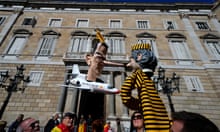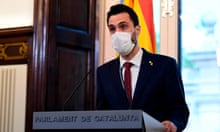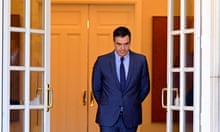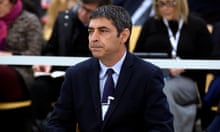The Catalan president, Quim Torra, has threatened to withdraw his crucial parliamentary support for Spain’s minority government unless it offers a new plan for regional independence by the end of the month.
His ultimatum to Pedro Sánchez, the Spanish prime minister, came a day after protests to mark the first anniversary of Catalonia’s unilateral independence referendum ended with riot police charging towards demonstrators outside the regional parliament.
Torra, a hardline nationalist who has been accused of stoking up the direct action that marred the commemoration, said the region’s patience “is not infinite” and called for a meeting as soon as possible.
“If there is no agreed mechanism by November, then the pro-independence parties will no longer guarantee stability in the Spanish parliament to Mr Pedro Sánchez,” he told the Catalan parliament on Tuesday afternoon.
Sánchez came into office through a vote of no confidence in the conservative administration of his predecessor, Mariano Rajoy. But to do so, he had to rely on the support of Basque and Catalan nationalists.
As Sánchez’s Socialist Workers’ party has only 84 of the 350 seats in Spain’s parliament, it is reliant on smaller nationalist parties to pass the budget and other key parts of its legislative agenda.
However, the Spanish government dismissed the threat on Tuesday evening. Its spokeswoman, the education minister, Isabel Celaá, told Torra that while negotiations on greater Catalan self-government remained on the table, the Sánchez administration would not be dictated to.
“The president of the Catalan government doesn’t need to wait until November for our answer. We’ll give it to him right now,” she said.
“The answer is self-government and not independence; the proposal is coexistence and not independence. The Spanish government does not accept ultimatums and maintains its determination to carry on with the path of dialogue.”
Celaá said Torra had made a mistake on Monday by “cheering on the radicals” as they scuffled with Catalan police, adding: “He’s making another mistake today by tossing around threats that only serve to damage the coexistence between Catalans.”
About 180,000 people were estimated to have gathered in Barcelona on Monday to mark the anniversary of the referendum and show their support for Catalan independence. Many of them carried banners reading: “1 October, no forgiving, no forgetting.”
However, the peaceful demonstrations were accompanied by the blocking of city streets, motorways and a high-speed rail line, and activists later attempted to surround the Catalan parliament and the Barcelona headquarters of the Spanish national police.
Torra had praised those undertaking direct action, urging them to “keep up the pressure”.
The Catalan police force, the Mossos d’Esquadra, said 30 of its officers were injured on Monday night as they tried to stop protesters forcing their way into the regional parliament and demonstrating outside the police HQ.
Sánchez had urged Torra to rein in those responsible for the violence. “Catalan politics has to come back to the Catalan parliament,” he tweeted on Tuesday morning.
“President Torra needs to fulfil his obligations and not jeopardise the political return to normality by encouraging radicals to besiege the institutions that represent all Catalans. Violence is not the answer.”
The scenes of unrest will be damaging for the Catalan independence movement, which has always prided itself on being peaceful and democratic – even in the face of the violence used by Spanish police to prevent the referendum.
But with the movement increasingly divided and political progress limited, its radical sectors are growing impatient at their leaders’ failure to deliver the republic they promised, and some have called for Torra to resign.
The former Catalan president Carles Puigdemont, who fled to Belgium after the Spanish government sacked him and his cabinet for staging the referendum, was among the first to criticise the masked activists who had tried to enter parliament.
“If they’re wearing hoods, they aren’t 1 October people,” he tweeted. “If they use violence, they aren’t 1 October people. We did it with our faces uncovered and in a peaceful way. That is how, a year ago, we overcame an authoritarian state.”
Puigdemont’s former vice-president Oriol Junqueras – who has been in custody awaiting trial for almost a year – also called on pro-independence Catalans to remain peaceful in their protests.
“The 1 October taught us that truncheons and blows are always the worst solution and cannot be our way,” he wrote on Twitter. “We still have open wounds, we are people of peace and ours is, and always has been, a peaceful movement.”










